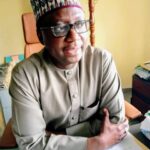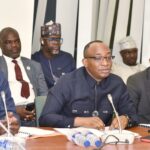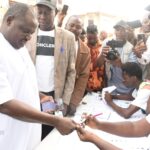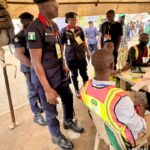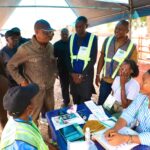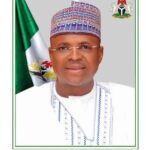By Deborah Coker
Mr Thomas Stelzer, Dean, International Anti-Corruption Academy, (IACA), Vienna, Austria, has faulted the measuring tool used by Transparency International (TI) in its Corruption Perceptions Index (CPI).
This is contained in a statement issued on Friday in Abuja by Mrs Azuka Ogugua, spokesperson of the Independent Corrupt Practices and other related offences Commission (ICPC).
According to Ogugua, Stelzer made the observation when he visited the ICPC headquarters as part of activities of his working visit to Nigeria.
He noted that the TI measuring tool, had lots of gaps that needed to be bridged, adding that governments were doing so much but do not get credit.
Stelzer, who is IACA’s Executive Secretary of Assembly of Parties, stated that TI’s CPI puts governments in difficult positions because no matter how hard governments of nations work, they were exposed and reduced to the perceptions of constituents.
He said as a way out, the IACA was working on measuring corruption as part of its research work by putting together all the expertise, bringing on board everybody who had something to contribute to the project in order to see the right methodology to adopt for better results.
“We are totally imperative, we are transparent, and we want everyone to participate from the beginning so that we can hold everybody accountable in implementing later what we might have agreed on.
“And we would also like your Academy to contribute,” he said.
The IACA dean also explained that International Anti-Corruption Academy was the only intergovernmental, international organisation that concentrates on the holistic fight against corruption.
He also said that it was the only organisation that enjoys the status of an institution of higher learning, authorised to offer academic degrees, offering technical assistance and capacity building to practitioners to facilitate implementation of the provisions of the United Nations Convention Against Corruption (UNCAC).
In his remarks, the ICPC Chairman, Prof. Bolaji Owasanoye, SAN, gave a brief background of the Commission vis-à-vis her statutory mandate.
Owasanoye explained that though ICPC was set up in year 2000, a few years before UNCAC, it commendably reflects UNCAC’s principles and focus which could be seen in the commission’s tripartite mandate.
He gave a rundown of the three-pronged mandate of enforcement, prevention and enlightenment.
He added that though not easily measurable, ICPC made a lot of progress under its preventive mandate, which wass not measured nor captured by the CPI.
He added that though the efforts contributed massively to the fight against corruption.
He listed some other specific projects ICPC engaged in to include being the secretariat for inter-agency committee on stopping Illicit Financial Flows (IFFs) in Nigeria.
He explained that in that capacity, the commission organises capacity building on slippery areas such as tax evasion, transfer pricing, trade mis-invoicing for organisations connected to IFFs.
“Issuance of advisories to government on dumping the use of confidentiality clauses in extractive industry and eradication of the use of tax waivers for multinational companies.
Other activities according to him included designing guidelines for the private sector to recognise vulnerabilities to IFFs in their operations.
“Being central in propagating the Common African Position on Assets Recovery (CAPAR) by collaborating with the High-Level Panel chaired by former South African President, Thabo Mbeki; training of the media on using perception tools among other activities.”
The Chairman also revealed that ICPC through its training arm, ACAN, has begun conducting surveys of experiences with corruption, in order to know how to adjust and deal with issues instead of relying solely on the annual report by TI.
“We would love to be able to partner with IACA to become a regional hub for some of our activities and those of IACA to exchange staff once we agree on the parameters.
“And to test the waters by having some activities at the regional level jointly with funding from partners to build capacity within anti-corruption agencies and in the broader context among stakeholders and public sector players towards diminishing corruption,” Owasanoye said. (NAN) (www.nannews.ng)
========
Edited by Isaac Aregbesola


